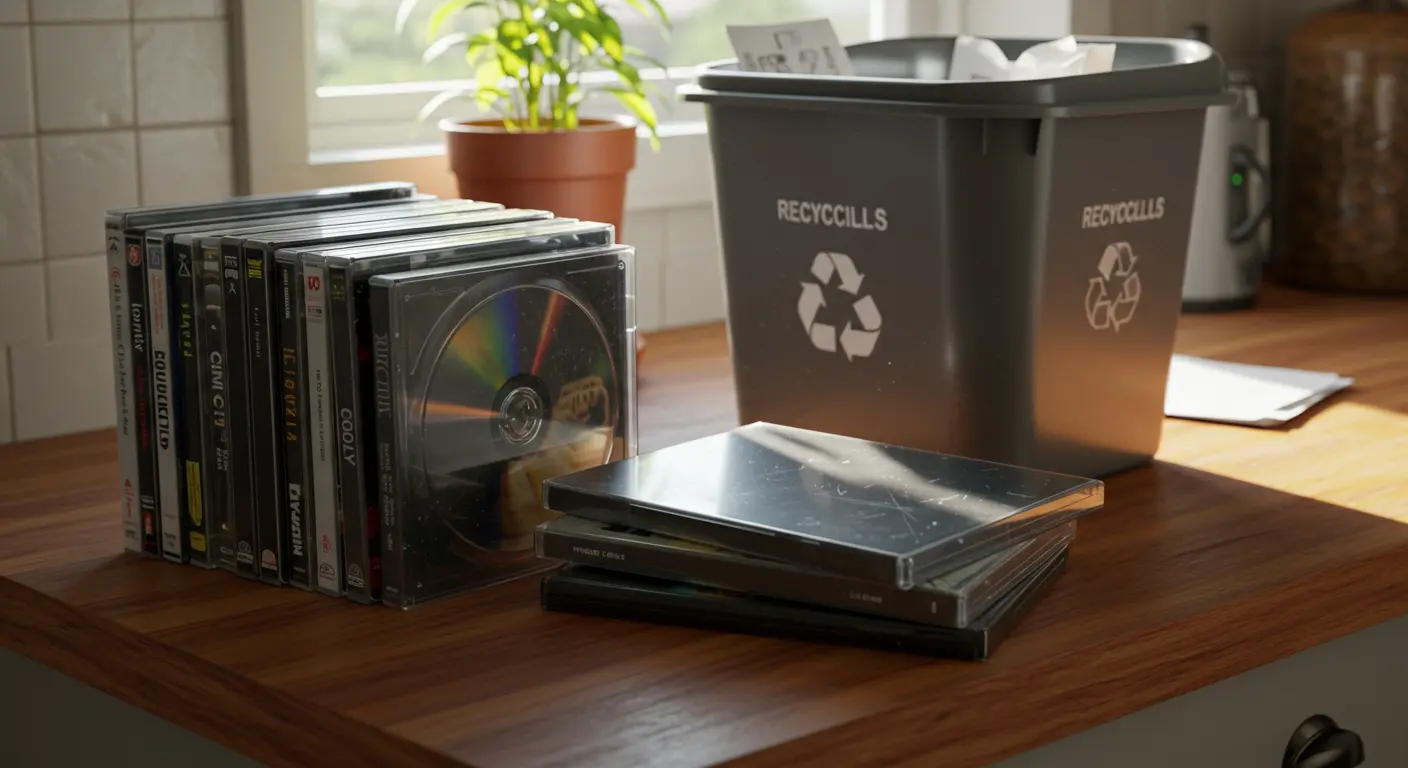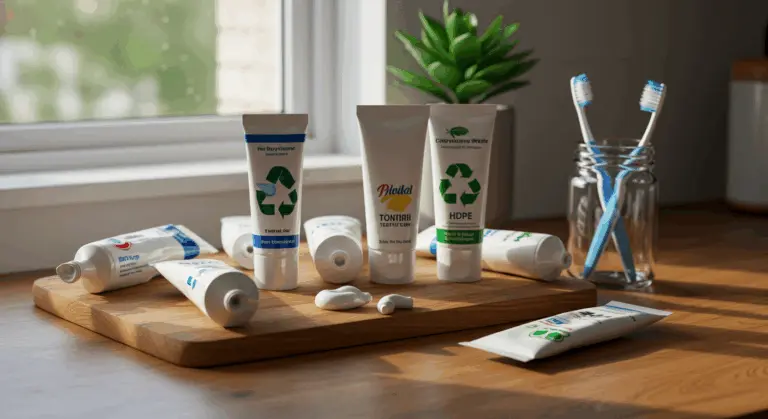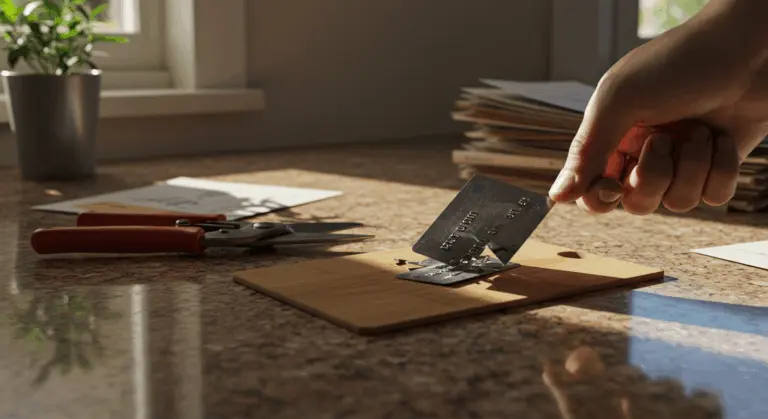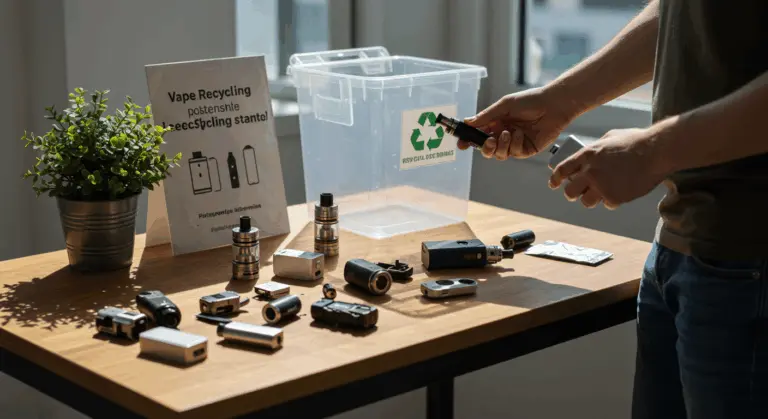Understanding DVD Case Materials – What They’re Made Of
Understanding whether DVD cases can be recycled involves looking at their material composition. Most DVD cases are crafted from either polystyrene (plastic #6) or polypropylene (plastic #5), varying by manufacturer and production era. These cases differ significantly from the DVDs themselves, which consist of polycarbonate (plastic #7) with a reflective aluminum coating.
You’ll recognize polystyrene DVD cases by their rigid, brittle feel—they’re the standard for most commercial releases. This material creates some difficulties for recycling programs due to its chemical composition. Meanwhile, polypropylene cases offer more flexibility and enjoy broader acceptance in municipal recycling programs.
DVD cases often contain additional components that complicate recycling and must be separated first:
-
Paper inserts
-
Plastic film overlays
-
Metal hinges or clips
These material distinctions are important—each plastic type demands its own recycling approach. While the polycarbonate discs themselves have value as a recyclable material (when properly processed to separate the aluminum layer), the cases follow a different recycling stream entirely. This complexity is why different facilities have varying policies on what they’ll accept.
Recycling DVD Cases – What You Need to Know
Begin by separating all non-plastic components from your DVD cases. Paper inserts join your regular paper recycling stream, while the plastic case requires separate handling.
Once prepared, these plastic cases can enter recycling programs—provided your local facility accepts their specific plastic type (#5 or #6). However, different programs have different policies.
Many facilities specifically require removal of plastic film overlays and metal components before processing. These mixed materials can interfere with the recycling process if not properly separated. Those clear plastic film covers? They’ll need peeling off if your facility can’t handle mixed materials.
Where to Recycle DVDs and DVD Cases – Your Options
DVDs and their cases follow entirely different recycling paths. The discs themselves—polycarbonate and metal composites—typically end up in general waste since most facilities lack the specialized processing capabilities.
Beyond curbside recycling, several specialized options exist:
-
Electronics Retailers: Stores like Best Buy often have recycling programs that accept DVDs and cases.
-
Municipal Events: Check for local e-waste recycling events.
-
Mail-in Programs: Services like Green Disk or the CD Recycling Center of America handle large collections, sometimes for a fee.
When curbside recycling falls short, recycling locator tools like Earth911 can pinpoint specialized centers accepting these specific plastic types.
Creative Ways to Repurpose Old DVDs and Cases
Rather than sending old DVDs and cases to the landfill, consider giving them new life through creative projects.
The reflective surface of old discs makes them perfect for craft projects:
-
Mosaics: Cut discs into small pieces to create shimmering mosaic art.
-
Wall Decor: Use whole discs for wall installations or mobiles.
-
Coasters: Back discs with felt or cork to make unique drink coasters.
-
Clocks: Use a disc as a reflective base for a DIY clock.
The cases are also versatile for repurposing:
-
Organizers: Use them to store small items like beads, buttons, or seeds.
-
Picture Frames: Convert them into unique frames for photos.
-
Miniature Greenhouses: Use them to start seedlings.
-
Modular Storage: Connect multiple cases to create storage for office supplies.
Artistic souls can draw inspiration from professionals like Daniel Hangar, who has created impressive installations using discarded DVDs. His installations project movie clips onto disc arrangements, combining visual and audio elements into captivating displays. Your home projects may be smaller in scale, but they can match his work in creativity and personal significance.
These projects save useful materials from the trash while adding character to your home. With some imagination, you can transform your old media collection into something completely new.
Donating Old DVDs – A Sustainable Alternative
Before considering recycling or upcycling, donation is often the most environmentally friendly option. Functional DVDs gain extended lifespans through donation, reducing the need for new products.
Many organizations still welcome DVD donations:
-
Charity Shops: Local thrift stores often accept and resell used DVDs.
-
Libraries: Public libraries may add donated DVDs to their collections.
-
Schools: Educational institutions can use films, especially documentaries, for classroom learning.
You can also give away or sell DVDs directly through:
-
Community Groups: Local online groups (e.g., Buy Nothing Project) facilitate direct exchanges with neighbors.
-
Online Marketplaces: Platforms like eBay, Craigslist, or Facebook Marketplace are ideal for selling valuable titles.
Remember: DVDs fulfill roles that streaming simply cannot match. Physical media becomes essential for vacation homes lacking internet, travel entertainment, or connectivity-challenged areas. Collectors treasure specific editions for their bonus features, artwork, and cultural significance—elements often absent from streaming platforms.
To ensure your donation is useful, follow these steps:
-
Check Condition: Ensure discs are not badly scratched and clean them if necessary.
-
Include Originals: Provide the original cases and cover art when possible to increase their value.
Frequently Asked Questions About DVD Recycling
With DVD collections yielding to streaming dominance, people have more questions about proper disposal. Here are answers to the most common questions about DVD recycling:
Are DVD cases recyclable?
Yes—though your local program’s policies determine acceptance. These #5 or #6 plastics don’t universally find processing facilities. Check your local recycling guidelines first.
How do I prepare DVD cases for recycling?
To prepare cases for recycling, you must:
-
Remove all paper inserts and booklets (recycle these with paper).
-
Take out any soft plastic film or lining.
-
Ensure the case is clean and empty.
What about the DVDs themselves?
These polycarbonate-aluminum composites (#7 plastic) rarely gain curbside program acceptance. Look for specialized e-waste recycling programs or drop-off events.
What if my local program doesn’t accept DVD cases?
If curbside recycling isn’t an option, you can:
-
Donate: Give cases in good condition to charity shops or libraries.
-
Repurpose: Use them for organizing craft supplies, seeds, or photos.
-
Dispose: As a last resort, place them in your general waste bin.Are there specialized recycling programs for DVDs and cases?
Yes—electronics retailers and specialized recycling companies often maintain dedicated media programs. These specialized programs typically handle mixed materials far better than standard municipal operations. Search online for ”media recycling programs” in your area to find these specialized services.
Is it better to recycle or donate DVD cases?
For cases in decent condition, donation is usually the more environmentally friendly choice. This extends their useful life while avoiding the energy costs of recycling. Libraries, schools, and second-hand stores often welcome DVD cases, especially if they’re for popular titles or part of complete sets.




